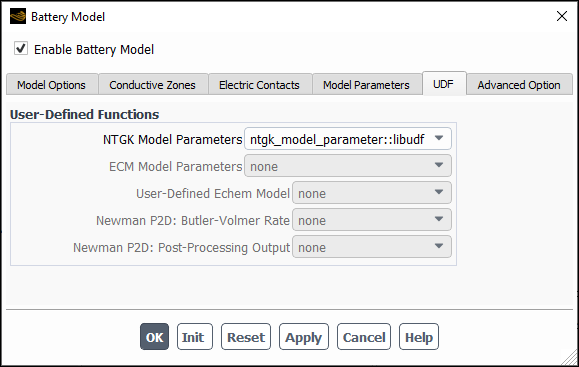After you have compiled (Compiling UDFs) your MSMD battery
model UDFs, the names of the functions you supplied as the first
DEFINE macro argument will become visible and selectable in
Ansys Fluent.
Note: All the battery model UDFs can only be compiled and cannot be run in the interpreted mode.
Battery model UDFs are hooked to Ansys Fluent using the Battery Model dialog box as follows:
DEFINE_BATTERY_ABUSE_RATEis hooked in the Advanced Option tab after you enable the One-Equation Kinetics Model option and select the UDF method for the Abuse Reaction Rate Type. The function name of yourDEFINE_BATTERY_ABUSE_RATEwill become visible and selectable in the Abuse Reaction Rate UDF drop-down list.DEFINE_BATTERY_CLUSTERis hooked in the Model Options tab. The function name of yourDEFINE_BATTERY_CLUSTERUDF will become visible and selectable in the Target Variable drop-down list (Solution Controls group box for the Dynamic clustering method).DEFINE_BATTERY_ELOAD_PROFILEis hooked in the Model Options tab. The function name of yourDEFINE_BATTERY_ELOAD_PROFILEUDF will become visible and selectable in the Profile UDF Function drop-down list (Profile UDF Function group box).DEFINE_BATTERY_ENTROPIC_HEATis hooked in the Advanced Options tab. When the Include Entropic Heat option is enabled and UDF is selected in the Data Type group box, the function name of yourDEFINE_BATTERY_ENTROPIC_HEATUDF will become visible and selectable in the Entropic Heat UDF drop-down list.DEFINE_BATTERY_PROPERTYis hooked in the Model Parameters tab. Once you select the user-defined option from the drop-down list for the corresponding property, the User-Defined Functions dialog box opens allowing you to select the function name.DEFINE_BATTERY_SWELL_LAYER_Nis hooked as follows:For the Newman P2D battery model,
DEFINE_BATTERY_SWELL_LAYER_Nis hooked in the Model Parameters tab. The UDF is available only when Include Swelling Effects is enabled in the Battery Model dialog box (Model Parameters tab).For the NTGK or ECM battery model,
DEFINE_BATTERY_SWELL_LAYER_Nis hooked in the Swelling Model Parameters dialog box that opens when you click Battery Swelling Model... in the Battery Model dialog box (Advanced Options tab).
Once you select the UDF option for the Electrode Layer Orientation, the name of your UDF will become visible and selectable in the Layer Normal Vector UDF drop-down list.
DEFINE_BATTERY_SWELL_STRAINis hooked in the Swelling Model Parameters dialog box that opens when you click Battery Swelling Model... in the Battery Model dialog box (Advanced Options tab). Once you select the Customize Swelling Strain option, the name of your UDF will become visible and selectable in the Swelling Strain UDF drop-down list.The UDF is available only for the NTGK and ECM battery models.
All other battery model UDFs are hooked in the UDF tab.
The function name of your UDF will become visible and selectable in the appropriate drop-down list located to the right of each of the battery model UDFs (for example, ntgk_model_parameter::libudf for NTGK Model Parameters).
See Battery Model DEFINE Macros for details about MSMD battery model
UDFs.



